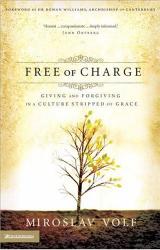 Summary: We should give not out of obligation but out of appreciation for what God has given to us. Forgiveness is a particular type of giving, but it is even more important that we offer forgiveness to one another because we need forgiveness and because God has forgiven us.
Summary: We should give not out of obligation but out of appreciation for what God has given to us. Forgiveness is a particular type of giving, but it is even more important that we offer forgiveness to one another because we need forgiveness and because God has forgiven us.
This is a hard book to review. It is only six real chapters (plus a forward, an interlude, an epilogue, and a conclusion.) But in the 225 pages of content, I highlighted 43 passages (many of them are multi-paragraph highlights). I cannot think of any other book I have ever highlighted so much.
There is so much rich theology about who God is, how God works in us, and how God wants us to work in the lives of others. And this is not simple ‘five steps to loving God and your neighbor’ self-help writing. This is rough going. I read this over a month and still feel like I read it too quickly.
The first (long) chapter dealt with who God is. This is central to Volf’s understanding of how we can understand both giving and forgiving. Volf says most people see God as either a negotiator or Santa Claus. In other words, they either see God as someone you can strike a deal with in order to get what you want, or they see him as someone who just gives stuff willy-nilly. Later Volf contrasts our perception of the giving God with our misperceptions of how we understand God’s forgiveness. People tend to see God as either an implacable judge, or as a doting grandparent.
This is a good summary statement for the book:
“You can sum up where we’ve landed in four simple sentences. The world is sinful. That’s why God doesn’t affirm it indiscriminately [like santa claus or a doting grandparent]. God loves the world. That’s why God doesn’t punish it in justice [like a negotiator or implacable judge]. What does God do with this double bind? God forgives.”
But there is so much more. In some ways I wish this were two shorter books. Because while the nature of giving and forgiving are linked in Volf’s understanding, they could be separated and it would be easier to recommend. Because even though 250 pages is not that long, it is heavy content. (Not hard to read, because Volf really is writing fairly simply; but it is hard to process.)
It is especially difficult to work through the issues of forgiveness. Because Volf is not primarily thinking about needing forgiveness for small things, but the big things. During the interlude, Volf tells of his brother that was tragically killed when he was 5 because the aging nanny was not watching him, and then the soldier that was playing with him allowed a tragic (but preventable) accident to occur. Volf’s parents from the beginning were intent on forgiveness. This in spite of the fact that Volf’s father had been tortured by the soldiers only a few years earlier (Volf grew up in communist Czechoslovakia.)
The forgiveness was so complete that Volf himself did not know that the nanny had been at all at fault until he was an adult. Volf’s father traveled for days to comfort the soldier and ensure that he would not be punished.
Volf is talking about the need for deep and real forgiveness for big things like war crimes, rape and murder because we also need forgiveness for the little things like lying and gossip. There were multiple examples of hard forgiveness because Volf’s theology of forgiveness was catalyzed during the war crimes and aftermath of the Bosnian and Croatian wars.
He is also clear that forgiveness is not pretending that something did not happen. The first step in forgiveness is bringing to full acknowledgement the actual sin committed. I stumbled across this long New York Times Article on how a family in Florida used this style of restorative justice in a case where their daughter’s boyfriend killed her. It is exactly the type of deep and difficult forgiveness that Volf is talking about because it is the way that the power of Christ can be shown.
Volf is very clear that forgiveness can only occur with the power of Christ and that it is really not us that is doing the forgiveness, but that God is inviting us to participate with him in giving and forgiving because it is a way that we can be changed and that giving, and especially forgiveness, demonstrates the love of Christ to others.
This is not an easy book to read. It is one of the most important books I have read an a while. A lot of Christian books read more like self-help books. This is not a self-help book, this is a book that demonstrates the radical work of Christ and the radical nature of what it means to be a Christian.
I recommend a lot of books, but this is one that I would put at near the top of your reading list.
Free of Charge: Giving and Forgiving in a Culture Stripped of Grace Purchase Links: Paperback, Kindle Edition


